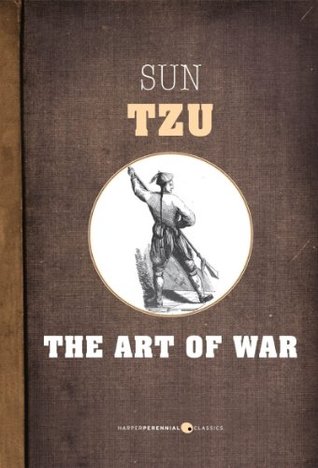More on this book
Community
Kindle Notes & Highlights
17. Thus we may know that there are five essentials for victory: (1) He will win who knows when to fight and when not to fight. (2) He will win who knows how to handle both superior and inferior forces. (3) He will win whose army is animated by the same spirit throughout all its ranks. (4) He will win who, prepared himself, waits to take the enemy unprepared. (5) He will win who has military capacity and is not interfered with by the sovereign. 18. Hence the saying: If you know the enemy and know yourself, you need not fear the result of a hundred battles. If you know yourself but not the
...more
1. Sun Tzu said: The good fighters of old first put themselves beyond the possibility of defeat, and then waited for an opportunity of defeating the enemy. 2. To secure ourselves against defeat lies in our own hands, but the opportunity of defeating the enemy is provided by the enemy himself. 3. Thus the good fighter is able to secure himself against defeat, but cannot make certain of defeating the enemy.
20. The onrush of a conquering force is like the bursting of pent-up waters into a chasm a thousand fathoms deep. So much for tactical dispositions.
9. There are not more than five cardinal tastes (sour, acrid, salt, sweet, bitter), yet combinations of them yield more flavors than can ever be tasted. 10. In battle, there are not more than two methods of attack—the direct and the indirect; yet these two in combination give rise to an endless series of maneuvers. 11. The direct and the indirect lead on to each other in turn. It is like moving in a circle—you never come to an end. Who can exhaust the possibilities of their combination? 12. The onset of troops is like the rush of a torrent which will even roll stones along in its course. 13.
...more
Water shapes its course according to the nature of the ground over which it flows; the soldier works out his victory in relation to the foe that he is facing. 32. Therefore, just as water retains no constant shape, so in warfare there are no constant conditions.
He who can modify his tactics in relation to his opponent and thereby succeed in winning, may be called a heaven-born captain. 34. The five elements (water, fire, wood, metal, earth) are not always equally predominant; the four seasons make way for each other in turn. There are short days and long; the moon has its periods of waning and waxing.
In war, practice dissimulation, and you will succeed. 16. Whether to concentrate or to divide your troops, must be decided by circumstances. 17. Let your rapidity be that of the wind, your compactness that of the forest. 18. In raiding and plundering be like fire, in immovability like a mountain. 19. Let your plans be dark and impenetrable as night, and when you move, fall like a thunderbolt.
Do not pursue an enemy who simulates flight; do not attack soldiers whose temper is keen. 35. Do not swallow bait offered by the enemy. Do not interfere with an army that is returning home. 36. When you surround an army, leave an outlet free. Do not press a desperate foe too hard. 37. Such is the art of warfare.
There are five dangerous faults which may affect a general: (1) recklessness, which leads to destruction; (2) cowardice, which leads to capture; (3) a hasty temper, which can be provoked by insults; (4) a delicacy of honor which is sensitive to shame; (5) over-solicitude for his men, which exposes him to worry and trouble.


